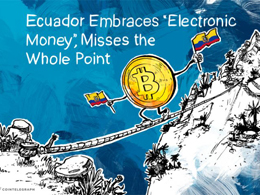
Ecuador’s e-Money Initiative Outlaws Bitcoin, Makes Mandatory for Banks to Follow Dictate
In July 2014, the National Assembly of Ecuador banned Bitcoin and decentralized digital currencies while establishing guidelines for the creation of a new, state-run currency, not a lot of people had thought the country would move so fast on the initiative. However, now Ecuador’s e-money initiative is about to see wider institutional involvement following a government directive. In a mandate in Resolution 064-2015-M, released on May 25 in the official register, the central bank of Ecuador gives the banks 360 days to get on board. With this, President Rafael Correa’s government is pushing....
Related News
Ecuador's e-money initiative, which kicked off earlier this year after the country outlawed bitcoin, is about to see wider institutional involvement following a government directive. The country's banks were ordered late last month to adopt the payment system within the next year, according to a report by Pan-Am Post's Belén Marty. The pace at which the banks are required to add support for the initiative, which is a digital representation of the US dollar - Ecuador's official currency - depends on their size. Ecuadorean banks that possess $1b or more in assets have 120 days to integrate,....
The path for any bank to approach new technology isn't a simple one. From first learning about a technology to discussing it with regulators and stakeholders, to finally integrating it with existing infrastructure, the timeline often constitutes a lengthy testing and review process. Yet despite these hurdles and the broader banking industry's apprehension, CBW Bank and Cross River Bank have become the first US institutions of their kind to adopt Ripple's distributed open-source payment protocol. In conversations with CoinDesk, executives from both banks explained why protocols like Ripple....
Ecuador’s national assembly voted Thursday afternoon, local time, in favor of a new draft of the country’s monetary and financial code that, among other things, establishes a state monopoly over the issuance of “electronic money.” The bill, with 91 votes in favor, now goes to President Rafael Correa, who must sign off on it before it can become law. “The project seeks to continue a process of conversion of a bourgeois class status to a popular classless state where the rules are not defined by the ruling class (conceived as the media power of private financial groups, corporatism....
From Asia to Europe, major central banks all around the world are expected to announce their own digital currencies soon. This is vindication that stablecoins like EURST are on the right path forward, and they can serve to show how national economies should reinvent themselves following the current crisis. Why Everyone Wants a CBDC Now There is a lot of discussions in economic forums and reports in the financial press these days about central bank digital currencies (CBDCs) and how they can help with building a new post-Covid economy. Many countries in various regions are said to be....
Why Do Banks Hate Bitcoin? Banks have been a part of our society for so long that we have forgotten what exactly they do. We think of them as bastions of security and stability. They hate Bitcoin because of it's inherent instability, right? Wrong. There is more to this than meets the eye. Economists are now asking the question: Do we need banks? The answers they are coming up with is somewhat surprising. There is a misunderstanding out there, of the role of banks today and, in particular, where all the money they loan out, comes from. The Bank of England recently published a paper called....





